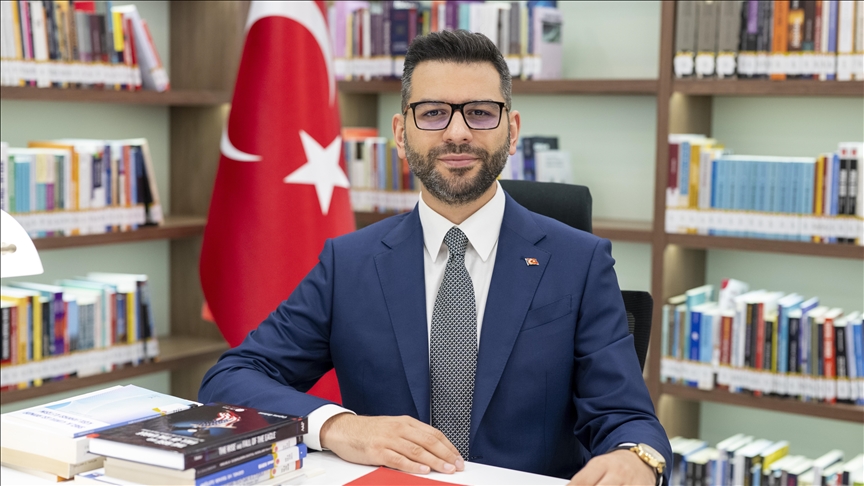WNAM REPORT: The new book by Assoc. Prof. Cagatay Ozdemir, the Turkish Presidency’s deputy head of communications, “The Rise and Fall of the Eagle: An Assessment of the Liberal World Order,” is officially out.
The book explores the establishment and ascension of the international liberal order, which is centered on the principles of US hegemony. It evaluates the extent to which various practices have disrupted this order and whether it has been successful or not.
Ozdemir’s book was published by Apple Academic Press in collaboration with Routledge/Taylor and the Francis Group, leading international publishing houses.
The book analyzes how and why the liberal world order that emerged as a result of the end of the Cold War and the dissolution of the Soviet Union was established, how it began to rise, how it was linked to US hegemony, how it has been disrupted by various practices, and whether it has been successful.
The book offers a historical perspective on the liberal world order since the post-World War II period, which has been centered on the principles of American hegemony, including the free trade system, cooperative security, collective decision-making, and democratic unity. Additionally, it examines the challenges faced by the international system.
‘The liberal world order emerged following the Cold War’
Speaking on his new book, Ozdemir told Anadolu that it focuses on the role of American foreign policy in the liberal world order and ongoing discussions over its future.
Telling how the end of the Cold War had a tremendous impact on the global system and helped solidify the liberal world order’s position as the dominant paradigm, he said: “The liberal world order was constructed following the Cold War. This is an axis at the focal point of the debate on an international system, which is in fact centered on Fukuyama’s ‘End of History’ thesis and is seen as indestructible.”
Noting that the liberal world order is considered equivalent to American hegemony, Ozdemir added: “The post-Cold War transformations demonstrate that American hegemony is not very sustainable and is not fully entrenched in the international system. Both regional and global developments indicate that various perspectives are emerging in the world order. The book focuses on these fundamental paradoxical aspects.”
‘A reconstructed international system is needed’
“Although American hegemony is commonly seen as an invincible and unalterable axis, with the liberal world order serving as its roof, it is feasible to assert that the world order we observe is actually characterized by an opposite reality. The book provides a wealth of evidence to support this thesis,” Ozdemir stated, noting that the regional crises faced by American hegemony, the global crises challenging the liberal world order, and the underlying causes of these issues are examined in depth in his book.
He added: “The ascent of the radical right in Europe, the challenges to the liberal world order posed by Trump era foreign policy, global supranational structures such as the UN, NATO, and the EU losing their ground, the rise of Russia and China as dominant global players, and the overall transformation of the international system due to these factors highlight the necessity for a reconstructed international framework. I have aimed to address fundamental elements in this book, including the statement by our President (Recep Tayyip Erdogan), ‘The world is bigger than five,’ the necessity for a new axis in the international system, and the need for reform of the UN.”
‘Türkiye plays the role of arbitrator and mediator in conflicts’
Stressing that global and regional powers have evolved and new actors have emerged in the new world order, Ozdemir emphasized that the Republic of Türkiye is a significant actor due to its proactive foreign policy methods.
He said Türkiye plays the role of arbitrator, protector, and incidentally mediator both in conflicts in its region and in most global conflicts, and added: “Along these lines, we seek to underline in the book that the axes established by Türkiye’s multifaceted visionary diplomacy should be interpreted in conjunction with the transformation of the international global system. Why? Because the international liberal order is not solely about American hegemony. Thus, in the context of Türkiye’s pursuit of becoming a global actor, its efforts to address regional conflicts and eliminate the humanitarian crisis in Gaza, its role as a mediator in the Ukraine-Russia war, its involvement in resolving tensions in the Balkans, and particularly its presence in the Armenia-Azerbaijan conflict all hold considerable significance.”
Going beyond traditional and Western-centric paradigms of international relations, the book questions the validity and legitimacy of American hegemony and the liberal world order and points to how today’s world is evolving into a post-American world in which the relative influence and power of the United States are gradually shrinking.


